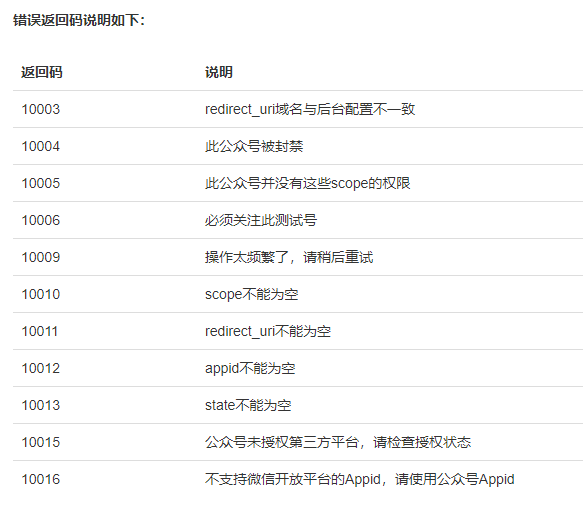首先微信公众号开发网页授权登录使用环境:
开发工具:eclipse;服务器:tomcat8,开发语言:JAVA。
我写的网页授权登录时用开发者模式自定义view类型按钮点击跳转链接的。
微信网页授权登录首先以官方微信开发文档为准,大体共分为4步:
先说第一步获取code:
code说明:code作为换取access_token的票据,每次用户授权带上的code将不一样,code只能使用一次,5�Y这未被使用自动过期。
微信公众开发文档给的有获取code的链接,建议直接复制来用,然后替换其中相应的参数即可。
链接为:
https://open.weixin.qq.com/connect/oauth2/authorize?appid=APPID&redirect_uri=REDIRECT_URI&response_type=code&scope=SCOPE&state=STATE#wechat_redirect
其中参数说明:
这官网上都有,这里展示是想说明一下scope参数,请注意看官网上给出的demo:
请注意微信授权登录scope两种redirect_url后面跟的链接使用的协议。
这个协议使用不当可能会在项目部署到服务器上测试时在安卓和ios上出现问题。
至此,以snsapi_base为scope发起的网页授权,是用来获取进入页面的用户的openid的,并且是静默授权并自动跳转到回调页的。用户感知的就是直接进入了回调页(往往是业务页面);
以snsapi_userinfo为scope发起的网页授权,是用来获取用户的基本信息的。但这种授权需要用户手动同意,并且由于用户同意过,所以无须关注,就可在授权后获取该用户的基本信息。
参数替换完毕如果以snsapi_userinfo为scope发起的网页授权,是在PC端点击菜单会跳出提示用户同意授权登录,如果用户未关注公众号时同样也会提示,示例页面:
如果是在移动端用户关注情况下则不会出现此页面。
如果用户同意授权,页面将跳转至 redirect_uri/?code=CODE&state=STATE,若跳转错误请根据日志输出的错误码在官网上查看相应的说明,附上官网上错误返回码说明:
然后是第二步根据链接传过来的code去获取网页授权access_token:
官网上给出的链接:
https://api.weixin.qq.com/sns/oauth2/access_token?appid=APPID&secret=SECRET&code=CODE&grant_type=authorization_code
这个access_token和基本的access_token不同,具体请参考官网说明,这里给出获取网页授权access_token的JAVA实现方法:
/**
* 获取网页授权凭证
*
* @param appId 公众账号的唯一标识
* @param appSecret 公众账号的密钥
* @param code
* @return WeixinAouth2Token
*/
public static WeixinOauth2Token getOauth2AccessToken(String appId, String appSecret, String code) {
WeixinOauth2Token wat = null;
// 拼接请求地址
String requestUrl = "https://api.weixin.qq.com/sns/oauth2/access_token?appid=APPID&secret=SECRET&code=CODE&grant_type=authorization_code";
requestUrl = requestUrl.replace("APPID", appId);
requestUrl = requestUrl.replace("SECRET", appSecret);
requestUrl = requestUrl.replace("CODE", code);
// 获取网页授权凭证
JSONObject jsonObject = CommonUtil.httpsRequest(requestUrl, "GET", null);
if (null != jsonObject) {
try {
wat = new WeixinOauth2Token();
wat.setAccessToken(jsonObject.getString("access_token"));
wat.setExpiresIn(jsonObject.getInt("expires_in"));
wat.setRefreshToken(jsonObject.getString("refresh_token"));
wat.setOpenId(jsonObject.getString("openid"));
wat.setScope(jsonObject.getString("scope"));
} catch (Exception e) {
wat = null;
int errorCode = jsonObject.getInt("errcode");
String errorMsg = jsonObject.getString("errmsg");
log.error("获取网页授权凭证失败 errcode:{} errmsg:{}", errorCode, errorMsg);
}
}
return wat;
}
需要的参数为开发者ID(AppID),开发者密码(AppSecret),和获取到的code。正确返回json数据包为:
然后第三步,如果需要的话进行,方法和第二步类似,所需链接官网给的有。
最后一步是获取用户的信息(需要scope为snsapi_userinfo,snsapi_base只能获取到用户的openId):
所需要的请求方法:
http:GET(请使用https协议) https://api.weixin.qq.com/sns/userinfo?access_token=ACCESS_TOKEN&openid=OPENID&lang=zh_CN
然后替换成相应的参数,JAVA代码为:
/**
* 通过网页授权获取用户信息
*
* @param accessToken 网页授权接口调用凭证
* @param openId 用户标识
* @return SNSUserInfo
*/
public static SNSUserInfo getSNSUserInfo(String accessToken, String openId) {
SNSUserInfo snsUserInfo = null;
// 拼接请求地址
String requestUrl = "https://api.weixin.qq.com/sns/userinfo?access_token=ACCESS_TOKEN&openid=OPENID&lang=zh_CN";
requestUrl = requestUrl.replace("ACCESS_TOKEN", accessToken).replace("OPENID", openId);
// 通过网页授权获取用户信息
JSONObject jsonObject = CommonUtil.httpsRequest(requestUrl, "GET", null);
if (null != jsonObject) {
try {
snsUserInfo = new SNSUserInfo();
// 用户的标识
snsUserInfo.setOpenId(jsonObject.getString("openid"));
// 昵称
snsUserInfo.setNickname(jsonObject.getString("nickname"));
// 性别(1是男性,2是女性,0是未知)
snsUserInfo.setSex(jsonObject.getInt("sex"));
// 用户所在国家
snsUserInfo.setCountry(jsonObject.getString("country"));
// 用户所在省份
snsUserInfo.setProvince(jsonObject.getString("province"));
// 用户所在城市
snsUserInfo.setCity(jsonObject.getString("city"));
// 用户头像
snsUserInfo.setHeadImgUrl(jsonObject.getString("headimgurl"));
} catch (Exception e) {
snsUserInfo = null;
int errorCode = jsonObject.getInt("errcode");
String errorMsg = jsonObject.getString("errmsg");
log.error("获取用户信息失败 errcode:{} errmsg:{}", errorCode, errorMsg);
}
}
return snsUserInfo;
}
上面所述皆是根据微信公众号官网以及百度所写。另外还参考一篇很不错的微信公众号开发文档,可以说是带我入的门,给个链接:
下面说一下微信网页授权登录中遇到的code been used问题:
我在微信网页授权登录写完之后开始测试,在保证代码的正确性与准确性后,打开微信公众号,点击自己定义跳转链接的菜单,并成功进入,但是在点击刷新或者回退是会报错,错误的信息就是code been used。
官网上给出的说明很详细,code只能被使用一次,如果显示code been used则说明code被重复使用了。
首先说一个简单的code been used错误的产生:
有的开发者在写网页授权登录时会出现这样的页面:
这是在微信开发公众号上没有配置安全域名,导致微信网页授权登录时会显示这样的页面,url跳转了两次,传入的code被重复使用了,遇到这种的可以现在微信开发公众号里面配置安全域名。
然后说普遍遇到的code been used问题。
基本思路时:当我点击菜单按钮进入页面时,先去sssion缓存中去那由code获取到的openId,如果openId不存在,则证明code为首次使用,可以根据传过来的code获取相应的access_token和openId。
如果存在,则直接使用获取到的openId去获取用户的一系列信息。
我用的时springMVC,简单实现代码为:
首先在开发者定义的菜单路径上配置域名和跳转的控制器方法:
前面模糊的是自己配置的域名,后面/weixin/redirect则是要跳转的方法。
跳转到的方法为:
JAVA代码:
/**获取用户openId
* @throws IOException */
@RequestMapping(value = "/redirect", method = RequestMethod.GET)
public ModelAndView repairs(ModelAndView mav, HttpServletRequest request, HttpServletResponse resp) throws IOException{
String openId = (String) request.getSession().getAttribute("openId");//先从缓存中获取通过code得到的openID
System.out.println(openId);//测试输出openId
if(openId==null){//判断openId是否为空(判断code是否为第一次被使用)
RedirectUtils.redireUrl1(request, resp);//openid为空也就是code被第一次使用时跳转方法
return null;
}
mav.addObject("openId",openId);//没有被使用时
mav.setViewName("/weixin/repairs");//返回要跳转的视图页面
return mav;
}
RedirectUtils.redireUrl1(request, resp);为重定向跳转的路径。JAVA代码:
public static void redireUrl1(HttpServletRequest request,HttpServletResponse response){
System.out.println("跳转");//测试是否跳转过来了
String a="";
if(request.getQueryString()!=null){
a="?"+request.getQueryString();
}
String url = Base64.getBase64(request.getRequestURL()+a);//此为链接中带的一些参数 不需要可以不用写
System.out.println(request.getRequestURL()+a);
String basePath = WeChatConfig.URL+"weixin/wxyz?url="+url;//redirect_uri地址
System.out.println(basePath);
String urls="https://open.weixin.qq.com/connect/oauth2/authorize?appid=" + WeChatConfig.APP_ID+
"&redirect_uri=" + CommonUtil.urlEncodeUTF8(basePath)+
"&response_type=code" +
"&scope=snsapi_userinfo" +
"&state=STATE#wechat_redirect";
try {
response.sendRedirect(urls);//重定向执行url
}catch(Exception e){
e.printStackTrace();
}
}
其中Base64.getBase64为Base64加密方法,WeChatConfig.URL为你自己微信公众平台配置的安全域名,CommUtil.urlEncodeUTF8对重定向链接进行编码。
提供一下Base64方法中的加密解密方法,请先下载相应的jar包:
**
* Base64工具 CREATE 2016.12.14 form yjf
*
*/
public class Base64 {
/**
* Base64加密
*
*/
@SuppressWarnings("restriction")
public static String getBase64(String value) {
byte[] bytes = null;
String basevalue = null;
try {
bytes = value.getBytes("utf-8");
} catch (UnsupportedEncodingException e) {
e.printStackTrace();
}
if (bytes != null) {
basevalue = new BASE64Encoder().encode(bytes);
}
return basevalue;
}
/**
* Base64解密
*
*/
@SuppressWarnings("restriction")
public static String getFromBase64(String basevalue) {
byte[] bytes = null;
String result = null;
if (basevalue != null) {
BASE64Decoder decoder = new BASE64Decoder();
try {
bytes = decoder.decodeBuffer(basevalue);
result = new String(bytes, "utf-8");
} catch (Exception e) {
e.printStackTrace();
}
}
return result;
}
}
然后时CommUtil.urlEncodeUTF8编码代码:
/**
* URL编码(utf-8)
*
* @param source
* @return
*/
public static String urlEncodeUTF8(String source) {
String result = source;
try {
result = java.net.URLEncoder.encode(source, "utf-8");
} catch (UnsupportedEncodingException e) {
e.printStackTrace();
}
return result;
}
然后方法执行response.sendRedirect(urls);跳转回wxyz方法进行获取一系列参数,代码为:
@RequestMapping(value="/wxyz",method=RequestMethod.GET)
public ModelAndView wxYz(ModelAndView mvc,HttpServletRequest req,HttpServletResponse response){
System.out.println("微信验证");//测试是否跳转到此方法中
String code=req.getParameter("code");//获取url参数中的code
WeixinOauth2Token weixinOauth2Token = AdvancedUtil.getOauth2AccessToken(WeChatConfig.APP_ID, WeChatConfig.APP_SECRET, code);
if(weixinOauth2Token.getOpenId()!=null){
String openId = weixinOauth2Token.getOpenId();
req.getSession().setAttribute("openId",openId);//将获取到的openID存入session缓存中
System.out.println("openId"+openId);
mvc.addObject("openId",openId);
mvc.setViewName("redirect:/weixin/wxLogin");
return mvc;
}
return null;
}
其中AdvancedUtil.getOauth2AccessToken方法时获取网页授权access_token 方法,代码为:
/**
* 获取网页授权凭证
*
* @param appId 公众账号的唯一标识
* @param appSecret 公众账号的密钥
* @param code
* @return WeixinAouth2Token
*/
public static WeixinOauth2Token getOauth2AccessToken(String appId, String appSecret, String code) {
WeixinOauth2Token wat = null;
// 拼接请求地址
String requestUrl = "https://api.weixin.qq.com/sns/oauth2/access_token?appid=APPID&secret=SECRET&code=CODE&grant_type=authorization_code";
requestUrl = requestUrl.replace("APPID", appId);
requestUrl = requestUrl.replace("SECRET", appSecret);
requestUrl = requestUrl.replace("CODE", code);
// 获取网页授权凭证
JSONObject jsonObject = CommonUtil.httpsRequest(requestUrl, "GET", null);
if (null != jsonObject) {
try {
wat = new WeixinOauth2Token();
wat.setAccessToken(jsonObject.getString("access_token"));
wat.setExpiresIn(jsonObject.getInt("expires_in"));
wat.setRefreshToken(jsonObject.getString("refresh_token"));
wat.setOpenId(jsonObject.getString("openid"));
wat.setScope(jsonObject.getString("scope"));
} catch (Exception e) {
wat = null;
int errorCode = jsonObject.getInt("errcode");
String errorMsg = jsonObject.getString("errmsg");
log.error("获取网页授权凭证失败 errcode:{} errmsg:{}", errorCode, errorMsg);
}
}
return wat;
}
使用此方法替换上相应的参数即可。因为微信授权登录会跳转两次链接,所以当获取成功则跳转到wxLogin方法中进行验证:
String bassPath1 = WeChatConfig.URL+"weixin/wxyz";//定义的路径
@RequestMapping(value="wxLogin1",method=RequestMethod.GET)
public ModelAndView wxLogin(HttpServletRequest request,HttpServletResponse response){
String openId = (String) request.getSession().getAttribute("openId");//先从缓存中去拿openId
if(openId==null){//如果没有的话
String url="https://open.weixin.qq.com/connect/oauth2/authorize?appid=" + WeChatConfig.APP_ID +
"&redirect_uri=" + CommonUtil.urlEncodeUTF8(bassPath1)+
"&response_type=code" +
"&scope=snsapi_userinfo" +
"&state=STATE#wechat_redirect";
try {
response.sendRedirect(url);
} catch (IOException e) {
e.printStackTrace();
}
}else{
return new ModelAndView("weixin/repairs");//返回页面
}
return null;
}
至此,打开所需要的页面,无论时第一次进入还是刷新 都不会出现code been used这种情况了,至少本人测试没有出现过。
以上就是本文的全部内容,希望对大家的学习有所帮助,也希望大家多多支持脚本之家。







